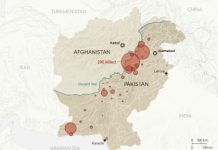Former U.S. President Donald Trump’s recent tour of the Gulf region — including stops in Saudi Arabia, Qatar, and the United Arab Emirates — marked a continuation of his signature foreign policy style, placing a premium on business deals and economic agreements rather than the nuanced practice of diplomacy. While the tour produced several landmark agreements and large-scale investment pledges, it also reignited long-standing debates about ethics, regional stability, and the role of the United States in the Middle East.
The visit to Saudi Arabia was particularly symbolic. Trump received a lavish welcome, signaling the Kingdom’s eagerness to maintain strong ties with the former president, whose administration had previously supported its leadership even amid international criticism over human rights issues. The centerpiece of the Saudi leg was a reported $142 billion arms deal, complemented by discussions of potential investments that could exceed $1 trillion. This level of economic engagement is unprecedented and signals Saudi Arabia’s intention to further modernize its defense and infrastructure sectors with American support.
In Qatar, the U.S. secured what has been described as a “historic” commercial deal: the purchase of 210 Boeing aircraft, the largest order in the company’s history. The agreement not only benefits the U.S. aerospace industry but also deepens the economic interdependence between the two nations. Defense contracts worth more than $1 billion were also signed, reinforcing Qatar’s role as a strategic military and economic partner in the region.
Trump’s stop in the UAE added a technological dimension to the tour. A new AI data center was announced, created in collaboration with Emirati tech company G42. This move aligns with the UAE’s ambitions to become a leader in artificial intelligence and digital innovation. The partnership also showcases the former president’s keen interest in aligning with Gulf nations’ long-term strategic visions, such as Saudi Vision 2030 and the UAE’s AI national strategy.
However, these economic accomplishments have been accompanied by renewed scrutiny. The region continues to be plagued by complex geopolitical tensions, including the ongoing humanitarian crisis in Gaza and Iran’s advancing nuclear program. Critics argue that Trump’s tour did little to address these pressing issues. Instead, it focused overwhelmingly on financial gain, sidelining the importance of diplomatic leadership and conflict resolution.
Moreover, concerns about the Trump family’s business interests in the Gulf are mounting. The former president’s commercial ties in the region — including licensing deals and real estate ventures — have raised ethical questions. Watchdog groups and policy analysts fear that such personal affiliations could compromise national policy, blurring the line between statecraft and private enterprise.
In conclusion, while Trump’s Gulf tour succeeded in forging impressive commercial agreements, it revealed a lopsided approach that prioritizes deals over diplomacy. The United States, as a global leader, must not retreat from its responsibility to engage in constructive diplomacy, especially in volatile regions like the Middle East. Economic cooperation is vital, but it must be balanced with a commitment to peace, human rights, and long-term regional stability.
Nakba Day observed globally amid renewed calls to end Gaza war
May 15 marks Nakba Day, a solemn occasion commemorated by Palestinians and their supporters worldwide to remember the catastrophe of 1948, when over 700,000 Palestinians were forcibly displaced during the creation of the state of Israel. This year, the observance of Nakba comes amid the devastating war in Gaza, giving the historic tragedy a grim contemporary echo and amplifying calls for an immediate end to Israeli military aggression.
Around the globe, millions gathered in protests, vigils, and educational events to not only reflect on the past but to condemn the ongoing humanitarian crisis unfolding in Gaza. From London to Jakarta, from New York to Cape Town, demonstrators demanded a ceasefire and an end to what many human rights groups and observers are calling a campaign of collective punishment against the Palestinian population. The airstrikes, blockades, and ground operations have led to the deaths of thousands, with the majority being women and children, and have destroyed homes, hospitals, and vital infrastructure.
This year’s Nakba observance is deeply interwoven with the present. As the Israeli military offensive in Gaza intensifies, so too does global outrage. Footage of destroyed neighborhoods, overcrowded refugee shelters, and mass graves has circulated widely, fueling a sense of urgency. International humanitarian organizations have repeatedly warned that the scale of suffering in Gaza is reaching catastrophic levels. Many countries have officially condemned Israel’s actions, with some even pushing for sanctions or legal action under international law.
The historical trauma of Nakba is no longer a distant memory for Palestinians—it is a lived experience, repeated in real time. For many, the echoes of 1948 are not just symbolic; they are painfully tangible. Entire families have been displaced yet again. Generations of Palestinians continue to live under occupation, with limited access to justice, rights, or even basic services.
It is not enough to remember the Nakba as a historical event. The international community must recognize its legacy as an ongoing reality that requires urgent action. Statements of sympathy must be followed by concrete political measures. There must be an immediate ceasefire in Gaza, an end to the blockade, and a renewed push toward a political resolution that guarantees Palestinians their right to self-determination, dignity, and safety.
The Israeli government must be held accountable for actions that may constitute war crimes under international law. Equally, it is imperative that all parties respect civilian life and work toward long-term peace. But peace cannot exist without justice. Nakba Day reminds us that the roots of the current conflict run deep and cannot be ignored or whitewashed by military might or political rhetoric.
In a world increasingly unified in its demand for human rights, the message from this year’s Nakba commemorations is clear: the war in Gaza must end now, and a just resolution to the Palestinian question is long overdue. The world is watching—and it must act.

















